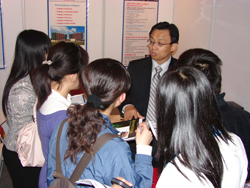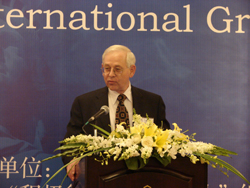 |
Jialin Zheng, M.D., answers questions from students at the International Graduate Scholarship Conference in Beijing on Saturday. A total of 1,200 outstanding Chinese students were invited to attend the conference by the China Scholarship Council. The students are interested in studying abroad in the U.S. Fourteen U.S. universities were represented at the conference |
 |
Vice Chancellor of Business and Finance Don Leuenberger makes a presentation on UNMC at the International Graduate Scholarship Conference in Beijing. |
He’s putting on a show.
Of the 14 U.S. universities at the conference, he is one of the few representatives who speaks Chinese.
The 1,200 students who have been invited to the conference by the China Scholarship Council (CSC) are the best and brightest in China. They pepper Dr. Zheng with questions about going to graduate school in the United States.
Without hesitation, he gives them the answers. And — best of all — always with a smile on his face.
The students speak some English, but it’s obvious they feel much more comfortable speaking in their native tongue.
Wang Yan is a graduate student working on her Ph.D. at Shandong University in Jinan, China. She wants to do research on cardiovascular disease, and she’s hoping to do her post doc work in the United States.
She spends at least 15 minutes listening to Dr. Zheng. Her eyes sparkle and she seems mesmerized.
Afterwards, she praises Dr. Zheng for his insights.
“We’re blind about the universities in the U.S.,” she said. “He gave us very good suggestions to plan our study life.”
Having a booth at the conference is a very big deal for UNMC, which signed a formal agreement with the CSC on Oct. 16. The CSC places top Chinese graduate students in its 14 U.S. partner universities.
UNMC is the only CSC university that is solely an academic health science center. The other CSC partners include: University of Colorado, University of Chicago, Stony Brook University, Pennsylvania State University, Indiana University, Harvard University, Emory University, Washington University in St. Louis, Yale University, University of Southern California, University of Pennsylvania, University of Michigan and University of Illinois at Urbana-Champaign.
Among its ongoing programs in China, UNMC recently signed an agreement with Shanghai Jiao Tong University School of Medicine (SJTUSM) to initiate a joint M.D./Ph.D. program, the first such program between a U.S. and Chinese university.
Under the program, students will spend their first two years in medical school at SJTUSM, then come to UNMC for four years to earn their Ph.D., before returning to SJTUSM for two years to earn their medical degree.
“M.D./Ph.D.s can do both clinical and research work,” said Dr. Zheng, who is director of UNMC’s Asia Pacific Rim Development Program (APRDP). “It allows them to put two perspectives together and better understand the disease. “Education is very important for friendship. Friendships last forever — from generation to generation. It allows us to build a bridge between China and Omaha.”
U.S. universities have long depended on foreign students to serve as post docs, said Dan Monaghan, Ph.D., professor, pharmacology/experimental neuroscience, and one of the UNMC researchers making the trek to China.
He said he used to get about 90 applications per year for post docs, but with the travel restrictions placed on foreigners after the attacks of Sept. 11, 2001, the numbers have dwindled considerably.
“It’s no longer a pipeline of students,” said Dr. Monaghan, who ranks among the most highly cited scientists in the country in both neuroscience and pharmacology. “Now, it’s a two-way street. It’s all about collaborations. The globalization of science is the new model. Science is becoming more networked, more high-tech. It takes collaborations to work on big research projects.”
Dong Wang, Ph.D., associate professor of pharmaceutical sciences, said the United States continues to be an attractive destination for many foreign students.
“The quality of education in the U.S. is the key,” said Dr. Wang, who is a native of Beijing. “The education in the U.S. is the highest quality. China is a little behind the U.S., but there’s a lot of synergy now between the U.S. and China.”
Even Omaha’s most prominent citizen — Warren Buffett — agrees that China is critical to the world’s economic future.
In a speech earlier this year, he said: “The 19th century belonged to England, the 20th century belonged to the U.S., and the 21st century belongs to China. Invest accordingly.”